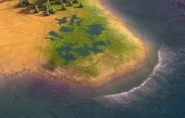m (→Strategy: Revised icons and links.) Tag: Visual edit |
m (+ interwiki) |
||
| Line 37: | Line 37: | ||
== Gallery == |
== Gallery == |
||
<gallery> |
<gallery> |
||
| − | + | Marsh tile in-game (Civ6).png|A Marsh tile, as seen in-game |
|
</gallery> |
</gallery> |
||
| + | |||
| + | [[ru:Болото (Civ6)]] |
||
Revision as of 17:23, 18 September 2019
Marshes are a terrain feature in Civilization VI. Marshes are found on flat Grassland tiles.
- Yields: +1
 Food.
Food. - Movement needed: 2
 Movement MPs
Movement MPs - Defense provided: -2 penalty
- Additional traits:
- -1 Appeal to surrounding tiles
- +1
 Science if worked by a city with a Zoo
Science if worked by a city with a Zoo - +1
 Production with the Lady of the Reeds and Marshes pantheon
Production with the Lady of the Reeds and Marshes pantheon
Strategy
Unlike in Civilization V, Marshes are more useful for a city. They now provide +1 ![]() Food (instead of subtracting it), making them helpful for promoting
Food (instead of subtracting it), making them helpful for promoting ![]() Population growth. They receive +1
Population growth. They receive +1 ![]() Production from the Lady of Reeds and Marshes pantheon, and there are some interesting resources, such as
Production from the Lady of Reeds and Marshes pantheon, and there are some interesting resources, such as ![]() Sugar Sugar, that are often found on Marsh tiles. They can also be used to construct Mont St. Michel, a useful wonder for players seeking a Religious or Cultural Victory.
Sugar Sugar, that are often found on Marsh tiles. They can also be used to construct Mont St. Michel, a useful wonder for players seeking a Religious or Cultural Victory.
Marshes can be incredibly useful for defensive purposes! Placing an army in a defensive position on the opposite side of a Marsh from an advancing enemy force will trap their melee units and allow your ranged units to pelt them from afar, inflicting more damage than usual (thanks to the defensive penalty of the Marsh).
They are not without drawbacks, however. Marshes still impose movement and combat penalties on units. In addition, like Rainforests, they will decrease the Appeal of nearby tiles.
Clearing a Marsh
Marshes are of limited use until Irrigation has been researched. Once that has occurred Builders can Harvest a Marsh to provide a lump sum of ![]() Food to the city owning its tile. The tile becomes Grassland and may thereafter support districts and wonders.
Food to the city owning its tile. The tile becomes Grassland and may thereafter support districts and wonders.
Civilopedia entry
Covered with herbaceous rather than woody plants, these freshwater wetlands are generally found along slow-flowing rivers or on the banks of lakes. Home to an incredible variety of valuable things, plant and animal, in some civilizations, towns in marshes and swamps grew into great cities: St. Petersburg, New Orleans, and the Brazilian ones in the Pantanal.

